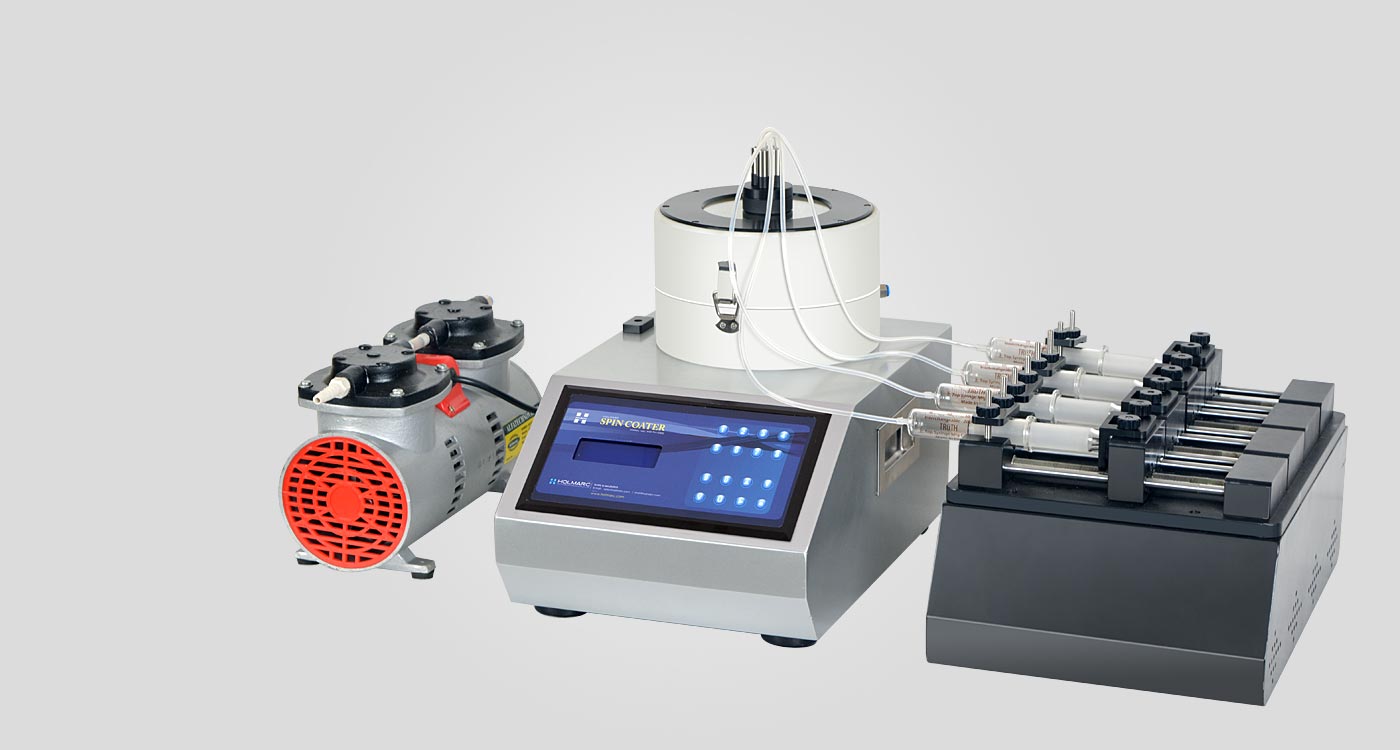
Spin Coating Unit

Holmarc’s Spin Coating Unit with Integrated Syringe Pump, Model no: HO-TH-05TS4 is a dedicated tabletop system to spin coat small substrates in research laboratories with well controlled spin process parameters. The high speed and duration range allows the user to achieve the desired thickness or thinness of the film. The spin head actuator is a precision DC servo motor, which requires less maintenance, with accurate speed and acceleration control. A vacuum chuck powered by oil-less vacuum pump holds the substrate at the spinning head. HO-TH-05TS4 has an independently controlled four channel syringe pump to disppense to the substrate automatically at the start of, or during, the spinning process. The pump is connected to the spinning bowl through Silicon tubing.
The device has user friendly front panel having keyboard and LCD for programming the spin process. Spin duration, spin speed, acceleration, etc. are all programmable parameters through the front panel. As the program memory is non-volatile, the recorded parameters are not lost in case of any power failure. This model is equipped with a memory of 9 pre-set, editable programs, each having 9 steps.
The device is compact and complete with electronics built into the unit within a footprint of 275 x 400 mm. All components in the device are corrosion protected to make it clean room compatible. The spin chamber is constructed in nylon with a diameter of 200mm. A transparent protective covering on top of the chamber makes spin coating a hassle free experience. Three sets of nylon anti-corrosive vacuum chucks are provided along with the equipment for holding substrate from 15 x 15 mm square to 100 x 100 mm square. Solvent drainage and vacuum release facilities are also provided in this device. Holmarc can provide customized models as per requirement.
Applications
Spincoating is ubiquitous in organic electronics, nanotechnology, semiconductor industries and other Industrial sectors.
Spin coating is widely used in microfabrication of functional oxide layers on glass or single crystal substrates using sol-gel precursors, where it can be used to create uniform thin films with Nano scale thicknesses. It is used intensively in photolithography, to deposit layers of photoresist about 1 micrometer thick.
Optional Accessories
● Digital Pipette for dispensing of liquid into the substrate
● Stand is used for holding manual pipette
● Vacuum adaptor to fix Petri dishes of sizes ranging from 30 mm - 100 mm diameter
● Mechanical clips or locks to hold samples without vacuum
Spin coating is one of the most common techniques used to deposit uniform thin films to flat substrates. It is used in a wide variety of industries and technology sectors. The advantage of spin coating is its ability to quickly and easily produce very uniform films, ranging from a few nanometers to a few microns in thickness.
In this technique, a small amount of coating material is applied on the center of the substrate, which is either spinning at low speed or not spinning at all. The substrate is then rotated at high speed in order to spread the coating material by centrifugal force. Rotation is continued while the fluid spins off the edges of the substrate, until the desired thickness of the film is achieved. The applied solvent is usually volatile, and simultaneously evaporates. So, the higher the angular speed of spinning, the thinner the film. The thickness of the film also depends on the viscosity and concentration of the solution and the solvent.

Established in 1993, Holmarc Opto-Mechatronics Ltd manufactures variety of scientific and engineering instruments for research, industry and education.
ISO 9001:2015 Made in INDIA
CIN : L33125KL1993PLC006984
GST No : 32AAACH9492C1ZQ
Navigation
Get in Touch
B.7., H.M.T. Industrial Estate
H.M.T. P.O, Kalamassery, Kochi
Kerala, India - 683 503
+91 920-719-7772 / 6 / 1
sales@holmarc.com
Mon - Sat : 9 am to 5 pm
Investor Zone # Online Dispute Resolution